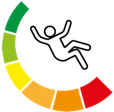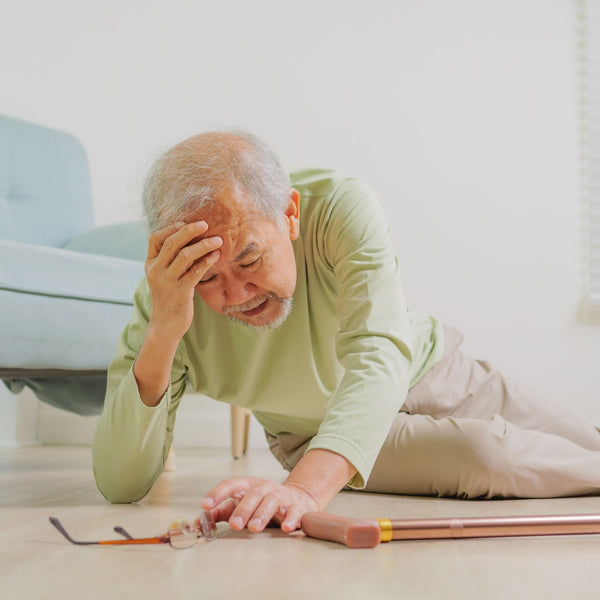Falls are a serious health issue and some older people never fully recover. The good news is that many falls are preventable with some forethought and the right measures in place.
According to guidance from Public Health England, people over 65 are at the greatest risk of falling. Falls and fractures are a serious health issue and extremely costly, both to the NHS and more importantly to the individual.
- Some older people will never fully recover from a fall, suffering from distress, pain, long term injury and loss of confidence.
- Falls can result in hip fractures, broken bones in older people.
- Worse still, falls can be fatal, and hypothermia is a risk if you fall on a cold night and can’t get back on your feet.
There are many risk factors for falling but the good news is that many falls are preventable with some forethought and the right measures in place.
Are you at risk of a fall?
Take our Falls Risk Assessmsent and download our free falls prevention guide.
It contains advice on avoiding falls and how to keep your loved ones safe at home.
Falls Risk Assessment Tool
Fall prevention tips: Improve your strength and balance
Activities that improve muscle strength in your legs, arms, back, shoulders and chest are particularly important as you get older.
They can make it easier to get out of a chair and, because they improve your posture, co-ordination and balance, they’re an effective way to reduce the risk of falling.
Moving about more strengthens your legs and makes you less prone to falling.
These activities will help your strength and balance:
- Use the stairs frequently.
- Slowly and repeatedly rise to a standing position from a chair.
- Walking, badminton, dancing or yoga.
- Special strength and balance exercise classes, tai chi or exercise to music.

Download our free Falls Prevention Guide when you take the Falls Risk Assessment.
Fall prevention tips: Eye care
Glasses fitted with bifocal or varifocal lenses can make objects and surfaces appear closer than they really are. This could cause you to trip or lose your balance, particularly on stairs.
Ask your optician for advice. Get your eyes checked and your prescription reviewed as often as your optician advises, and at least every two years.
Have a regular eye test, even if you think your sight is fine, as opticians can detect eye conditions at an early stage.
NHS eye tests are free once you reach the age of 60.
Fall prevention tips: Manage your medicines
Certain medicines, low blood pressure or poorly controlled diabetes can make you feel faint or dizzy. Let your GP or pharmacist know if you ever feel like this – they may need to check the dose or look at alternative medicines.
Alcohol can interact with some medicines and can affect your balance too. Check the leaflet that comes with your medicine for possible side effects.
More tips to prevent falls: Look after your feet
Problems with your feet can stop you getting out and about. They can also affect your balance and increase the risk of falling, so it’s important to report problems such as foot pain or decreased sensation in your feet to your GP, health care professional or practice nurse.
If you have arthritis, you may find that trainers or well cushioned shoes are more comfortable than ordinary shoes and offer better support. But make sure the soles aren’t too thick, as you could feel unsteady if you can’t feel the floor beneath your feet.
-
Wear shoes that fit well, for example high-sided shoes with low heels and thin soles with a strong grip are a good choice.
-
Avoid wearing sandals and shoes with high heels.
-
Wear slippers with a good grip and that fasten up. Loose or worn out slippers may cause you to trip.
-
Make sure your trousers or skirts don’t trail on the ground.
-
Always wear shoes or slippers. To avoid slips, don’t walk indoors in bare feet, socks or tights.
Checking your home environment
Look out for things around your home that could cause you to slip, trip or fall. Although some of these points may seem obvious, it’s surprising how often they can be overlooked – so it’s worth checking them.

Common risks of falling around the home
- Do you have good lighting, particularly on the stairs?
- Do you have a nightlight in the bedroom or a torch by the bed in case you need to get up in the night?
- Are floors clear of trailing wires, wrinkled or fraying carpets, or anything else that you might trip or slip on?
- Are stairs and steps free of clutter?
- Do you have handrails on both sides of the stairs?
- Do you have a non-slip mat and a fitted handrail in the bath? Consider whether to install grab bars
- Do you have non-slip mats under throw rugs?
- Does your pet wear a collar with a bell on? Pets can get under your feet, so be aware of where they are when you’re moving about.
- Do you rely on a stepladder to reach high places? Always ask someone to help if you’re using a ladder and never stand on a chair.
- Is your garden path clear and free from moss? Watch out for uneven paths and slippery surfaces as well. Carefully placed handrails and posts can be helpful if you need them.
A safe home assessment will highlight any trip hazards that can contribute to people falling and provide recommendations.
Tackling the fear of falling
We all stumble or trip sometimes, but the fear of falling can start to become a serious worry and can be quite difficult to deal with if not addressed quickly.
Don’t give up on your physical activities because you’ve had a fall, if you feel confident enough to keep doing them.
The anxiety may stem from having had a fall already, but it can play on your mind even if you haven’t fallen before.
This sometimes happens after a period of illness, which can leave you feeling weak and a bit unsure of yourself. As a result, you may become more cautious, limit what you’re willing to do, and lose confidence in carrying out daily tasks and activities. People living alone can be particularly fearful of falling.
You may even stop wanting to go out on your own. Worrying in this way isn’t unusual, but it can make you anxious, isolated or depressed. Fears about losing your independence can also make you reluctant to seek help.
Perhaps you’re worried that people will think you’re unable to look after yourself properly, or that they’ll suggest you move into a care home.
It’s important not to let such thoughts stop you from getting help.
A fall sensor can give you, and your family, the confidence that you can get help should you fall when there is no-one around. It can improve quality of life and combined with minimising falls risks with these tips, can help older persons to remain independent for longer.
With Taking Care, you can add elderly fall alerts and other sensors to work alongside your personal alarm service. Our personal alarms for the elderly help over 70,000 people stay in the homes they love. We offer 24/7 help at the touch of a pendant alarm, plus a medical support line staffed by qualified nurses. We also have pharmacists on hand to answer questions on pills and prescriptions.
Learn more about our elderly fall alarms.
Complete your Falls Risk Assessment
1-in-3 people aged 65 years and older will have a fall this year. Falls in older people can have severe consequences, with nearly a quarter of a million falls-related hopsital admissions each year among patients older adults over 65.

Our Falls Prevention Guide is full of practical tips to reduce the risk of falling
Complete our online risk assessment tool and receive your personalised Falls Risk Score. The score is graded out of five, indicating if you have a high risk of falling.
Falls Risk Assessment Tool
Complete our 2 minute questionnaire to receive personalised care recommendations based on an assessment of your loved one's circumstances.
Falls Risk Assessment Tool
Please note, the Falls Risk Assessment Tool should not be used in place of professional evaluation from a healthcare professionals.



